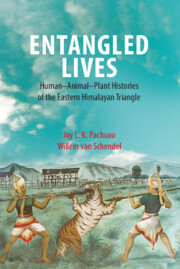11 - The Elephant Strikes Back
Published online by Cambridge University Press: 15 June 2022
Summary
The long history of humans in the Triangle is essentially a rural tale. As late as the 1970s, nine out of ten people lived rural lives. People, plants and animals lived in proximity, and therefore human encounters with plants and animals were intimately woven into daily life.
As we have seen, these encounters took many intricate forms. They could be mutually beneficial. For example, over the centuries, rice plants allowed humans to fill their bellies and in turn humans helped rice plants to spread in countless numbers across the Triangle. Microbes helped people to preserve food by fermenting it and thereby gave rise to distinct food cultures that cherished an astonishing diversity of fermented foods: bamboo shoots, soybeans, yak cheese, fish paste, rice beer and many more (Chapter 8). Encounters were also complex. Take cannabis, a native plant. Humans fed it to their household cattle, chickens or dogs to treat diarrhoea and weakness; applied it to themselves to cure bone fractures; or smoked it as a form of religious worship.
But human–non-human encounters could also be the opposite of beneficial. In Chapter 8 we saw that parasites and microbes wreaked havoc in human populations. Epidemics of measles, influenza, smallpox, cholera, malaria, and rinderpest occurred regularly. Besides, humans could also fall victim to combined plant–animal dynamics. Agricultural crops were attacked, and sometimes decimated, by insects and mites. Or wild pigs, elephants or monkeys would destroy them. And, occasionally, flowering bamboo plants and bamboo rats would cause ‘bamboo famines’ among humans (Plate 8.3).
As an invasive species in the Triangle, humans naturally depended for their survival on exploiting the wildlife that they found there. Foraging and hunting were forms of daily violent interference with their environment. The domestication of certain plants and animals may have started out as cross-species interaction and collaboration (Chapter 3), but it later developed into a form of purposeful genomic manipulation: selective breeding created organisms that suited humans better and made these dependent on human care. Routine ritualised killing of domestic animals – chicken, dog, pig, goat, water buffalo, mithun and more – underlined the utter vulnerability of these largely human-designed non-humans at the hands of their masters (Plate 11.1).
- Type
- Chapter
- Information
- Entangled LivesHuman-Animal-Plant Histories of the Eastern Himalayan Triangle, pp. 242 - 257Publisher: Cambridge University PressPrint publication year: 2022



